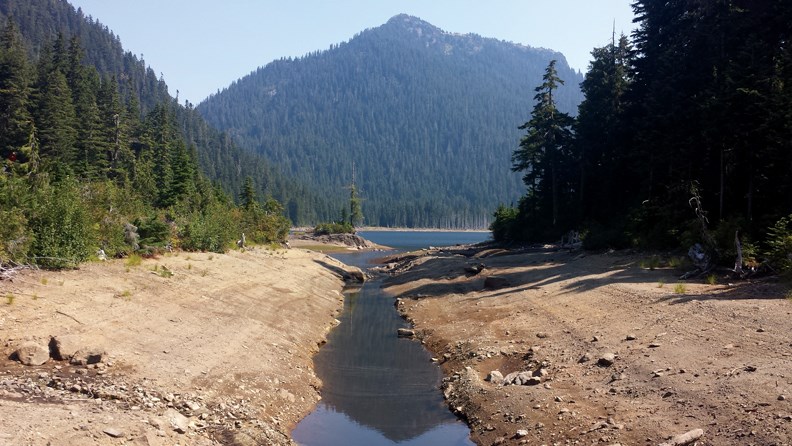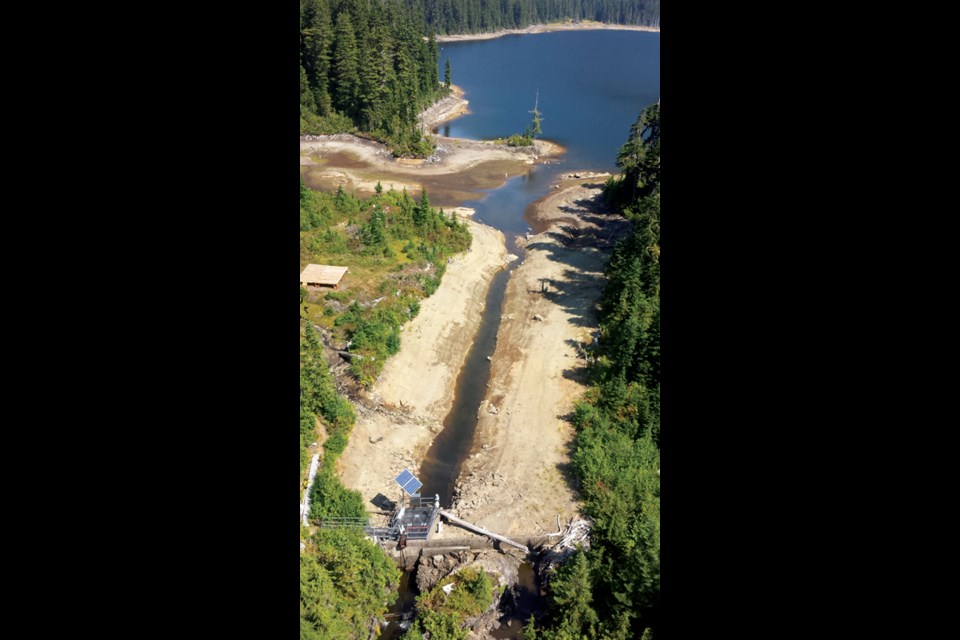Vancouver Coastal Health is urging caution in the use of grey water after the Sunshine Coast Regional District (SCRD) announced a ban on all outdoor watering and advised the public to recycle “clean” bathwater and dishwater to water plants and vegetables.
“We would be concerned with someone using grey water from the shower or washing dishes and putting it on food,” Dr. Mark Lysyshyn, acting medical health officer for the Sunshine Coast, said Wednesday.
Lysyshyn said it would be fine for people to collect water immediately after they turn on the shower to ensure that none goes to waste.
“But if they’re going to collect the water they shower in, that’s problematic,” he said. “It kind of depends on what grey water you use and how you use it.”
The SCRD announced Monday that it was moving to Stage 4 water use restrictions on Thursday, Aug. 13 for all regional water customers south of Pender Harbour.
Stage 4 bans the use of tap water for any outdoor purpose, whether through garden hoses, watering cans, irrigation systems or laid sprinklers.

Instead, the SCRD asked the public to “use clean grey water (e.g., water from a bathtub or sink) for watering outdoor plants and vegetables.”
Contacted Wednesday, SCRD acting chief administrative officer Angie Legault said the SCRD’s drought management plan was prepared in advance and she did not know if Vancouver Coastal Health (VCH) had vetted it.
But Legault said she had spoken to the VCH drinking water officer earlier in the day and the SCRD was going to step up its communication efforts to inform people of best practices for using recycled water.
Directives include “carefully and diligently applying water to the root system” rather than on the plant itself and advising people to ensure they clean their vegetables, herbs and fruits before they eat them, Legault said.
Another practice to avoid is applying the water on spaces where children play.
About 120 registered farms with water meters on their properties are exempt from the Stage 4 restrictions.
Chris Kelly, co-owner of Pratt Farm on Pratt Road in Elphinstone, said his operation is out of luck because he has applied for registered farm status but has yet to receive it, so is not eligible under the SCRD’s exemption.
Kelly said he is looking at losing vegetable crops from 52 raised beds as well as 125 apple trees. “It’s a huge loss,” he said.
The outdoor ban will also apply to commercial users, such as nurseries.
Legault said the SCRD had to “make choices,” given the current drought conditions. “We certainly sympathize with those people, but on the other hand, it’s our responsibility to make sure that water is available for human health, human consumption, fire suppression and environmental flows.”
Kelly said he’s heard that explanation. “But food is health,” he argued.
Sechelt resident Marc Nixon questioned the legality of people using grey water in their gardens.
“Using reclaimed water is not allowed unless registered under the Municipal Waste-water Regulation,” Nixon wrote a VCH official this week.
“My understanding is that untreated grey water is domestic sewage under the Sewerage System Regulation and discharging untreated effluent onto land would be a public health hazard and therefore it would be an offence to do so. In addition it would probably cause pollution.”
In an email to Coast Reporter, Nixon asked if “clean grey” water was “an oxymoron for morons.”
Lysyshyn confirmed that, under the Drinking Water Protection Act, grey water is considered sewage. But with the water shortage, he said, “we realize that’s not entirely practical. There’s grey water and there’s grey water.”
The key is using grey water carefully, Lysyshyn said.
With effluent from a washing machine, which some Sunshine Coast residents have said they are using on food crops, the concern would not be the soap content but “any pathogens that might be in the water,” he said. “That water could potentially be used to water flowers, but not something you’re going to eat.”
Water use in the regional system dropped by 40 per cent since the SCRD declared Stage 3 restrictions on July 10.
Bryan Shoji, the SCRD’s general manager of infrastructure services, said the Stage 4 restrictions are necessary because forecasts call for the hot, dry weather to continue into the fall.
Recent rainfall has not been sufficient to affect water levels in Chapman Lake, Legault said.
“My understanding from infrastructure is that we need a good, solid three days of rain to recharge.”
The only other time the SCRD declared Stage 4 restrictions was in early October 2012, after the longest drought on record. The ban lasted about one week and was lifted after the area received heavy rainfall.
In related news, the SCRD has learned that the federal and provincial governments will each contribute up to $1.72 million for water meters in the SCRD, covering two-thirds of the total project cost, estimated at almost $5.2 million. The grants are conditional on the SCRD funding the remaining one-third.
Universal water metering was identified as a key initiative in the SCRD’s comprehensive regional water plan. Despite the up-front cost, it is expected to save millions of dollars through conservation, reducing demand by 25 per cent. Metering will also enable the SCRD to track leaks in the system.
The meters will include backflow prevention devices to safeguard against water contamination in the distribution system from backflow through service lines.



